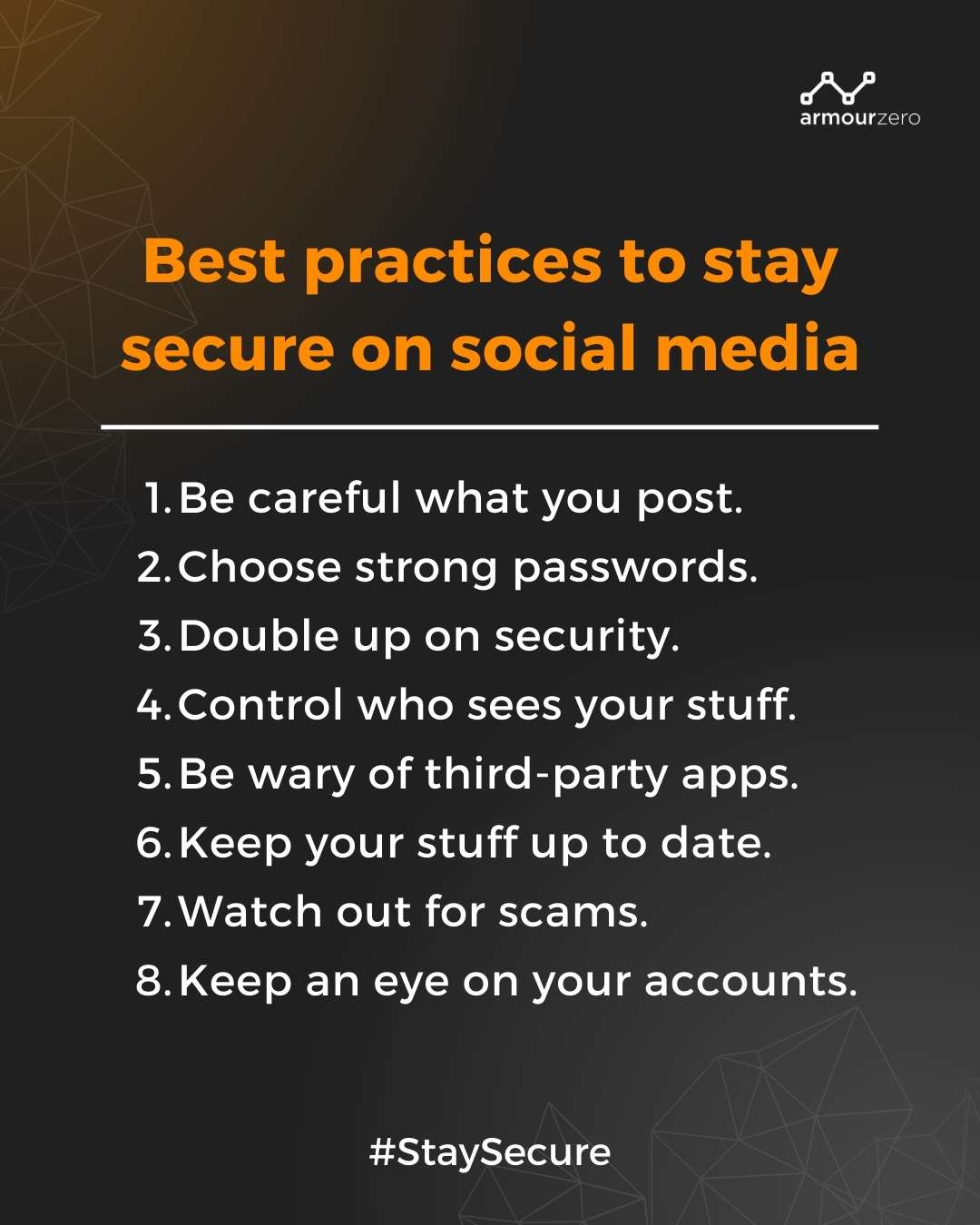Social Media Oversharing:
An Invitation to Cybercriminals

As we celebrate World Password Day this month, it’s a great reminder that having strong passwords is not the only way to protect ourselves from cybercriminals. We also need to be careful about what we share on social media. I mean, we all love social media, right? It’s a great way to connect with friends and family, share our experiences, and stay up-to-date with the latest trends. But here’s the thing, sometimes we don’t realise that we often overshare our personal information on social media, and that can be dangerous. When we post too much personal stuff, we’re basically giving cybercriminals a roadmap to hack into our accounts or steal our identity.
So, in this article, let’s talk about how oversharing on social media can put us at risk and how we can protect ourselves. We’ll explore how cybercriminals can use the information we share to their advantage and compromise our online security. We’ll also discuss some simple ways we can safeguard our online presence, such as using strong passwords and being mindful of what we share on social media.
Real-life cases of cyberattacks due to oversharing on social media
There are plenty of cases where people have been hacked, scammed, or blackmailed because they shared too much personal info online. And it’s not just celebrities – regular folks like you and me are at risk too. From identity theft to financial scams and everything in between, these cyberattacks can be seriously bad news. So it’s important to be mindful of what you’re sharing on social media and take steps to protect yourself and your personal information.
If you still don’t believe me, here are a few cases that happen because of social media oversharing:
- In 2020, a woman in Malaysia lost over $6,000 after falling for a scam on Facebook. The woman received a message from someone posing as a bank employee, who convinced her to share her bank account details and other personal information. The scammers then used the information to steal her money.
- In 2019, an Indonesian woman was scammed out of her life savings after she shared her personal information on social media. The woman was contacted by scammers who posed as bank employees and convinced her to give them her bank account details and personal information. The scammers then used the information to steal her money.
- In 2018, a man in Thailand lost over $300,000 after falling for a phone scam. The scammers convinced him to provide his bank account details and other personal information. The scammers then used the information to transfer money out of his account.
- In 2017, former FBI Director James Comey was the victim of a phishing attack. The attackers gained access to his personal Gmail account, which contained sensitive information about ongoing investigations.
- In 2014, Jennifer Lawrence’s iCloud account was hacked by a group of hackers who gained access to her private photos. The photos were then distributed online.
Those stories prove that you have to be super careful about what personal info you put out there on social media. It’s a prime target for cybercriminals, and they’re always looking for a way in. So, make sure you use strong passwords, turn on two-factor authentication, and be extra cautious about suspicious emails or messages. Protect yourself and your personal data!
How cybercriminals use information to carry out attacks
So, you might be thinking, “Why would anyone want to hack into my social media? I’m not famous or anything.” But hold up! Your personal data is actually super important, not just for yourself, but for your loved ones too. Cybercriminals can take that info and use it to pull all sorts of sneaky moves. Here are a few ways they can do it:
- Phishing: Scammers can use the info you post on social media to create fake messages that seem to come from trusted sources. They can use your personal details to make the message look like it’s from your bank, a social media platform, or another trusted entity. If you click on the link or enter your login details, they can steal your sensitive information or infect your device with malware.
- Social engineering: Cyber crooks can use the details you share on social media to build a profile of you and gain your trust. For example, they may pretend to be interested in your hobbies or chat with you about your interests. Once you trust them, they may ask for personal info or try to make you download malware.
- Physical attacks: Cyberattackers can use the location data you share on social media to track your movements and plan physical attacks such as robbery or kidnapping. They can also use your routine and habits to plan an attack.
- Identity theft: Scammers can use your personal details shared on social media to steal your identity and do fraudulent activities such as opening credit card accounts or applying for loans in your name.
And again, we need to always be careful about what we share on our social media.
You can also read about Vanity Award Scams that came across your social media.
Best practices to stay secure on social media
Alright, listen up! If you wanna keep your personal information safe on social media, there are some best practices you gotta follow. Don’t worry, it’s not rocket science or anything, but you gotta be careful. Here are some tips to help you out:

- Be careful what you post: Think twice before posting personal info on social media, and make sure it won’t cause any trouble. Don’t share sensitive info like your address, phone number, or bank details.
- Choose strong passwords: Use strong, unique passwords for your social media accounts, and if you’re struggling to remember them all, consider using a password manager.
- Double up on security: Turn on two-factor authentication on your social media accounts to make it harder for hackers to get in.
- Control who sees your stuff: Use privacy settings to choose who can see your posts and profile details. Don’t accept friend requests from random people you don’t know.
- Be wary of apps: Be careful about giving third-party apps access to your social media accounts. Only allow apps that you know and trust.
- Keep your stuff up to date: Update your devices and social media apps regularly to stay protected against known security risks.
- Watch out for scams: Be cautious of messages asking you to click on links or enter your login info. Always check if the message is legit before doing anything.
- Keep an eye on your accounts: Regularly check your social media accounts for anything unusual, such as logins from unknown devices or changes to your profile.
So, if you wanna avoid being a victim of cyberattacks on social media, follow these best practices and keep your personal info on lockdown! Trust me, it’s not worth the risk. Stay safe out there!
*This article has been published on e27.co on May 17, 2023
![]()
Written by:
Bernadetta Septarini (Content Marketing). Experienced content marketing and social media in the information technology and services industry.
Share this post
Related Posts

Safeguarding Your Organisation During the Hari Raya Holiday
- 09 Apr 2024
- By:Bernadetta Septarini
- Category: ArmourHacks
Protect your organisation from holiday cyberattacks during Hari Raya. Learn more about the risks and best practices for holiday security with ArmourZero.

Cyberattacks: A Growing Threat to Higher Education
- 02 Apr 2024
- By:Fanny Fajarianti
- Category: ArmourHacks
Universities hold sensitive data but face cyberattack risks in the digital age. Explore the impact of cyberattack and learn how to protect your institution.

Innovative Strategies for Cybersecurity in the AI Era
- 27 Mar 2024
- By:Bernadetta Septarini
- Category: ArmourHacks
Discover how AI is reshaping cybersecurity and safeguard your organisation in our latest blog post. Learn how to protect your business in today’s digital world.

Level Up Cybersecurity: How SIEM & SOAR Work Together
- 20 Mar 2024
- By:Armour Zero
- Category: ArmourHacks
Explore how ArmourZero’s cybersecurity platform unifies SIEM & SOAR for fast threat response without implementation costs or tech lock-in in this article.

